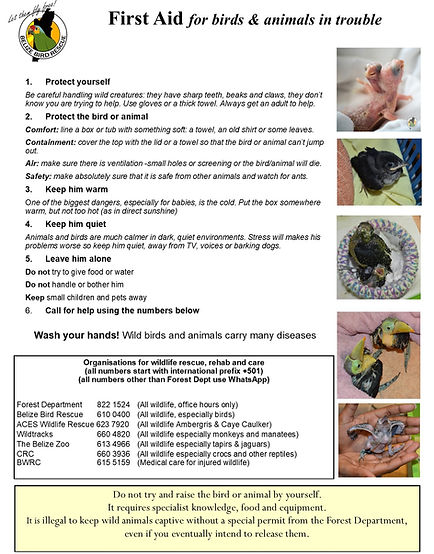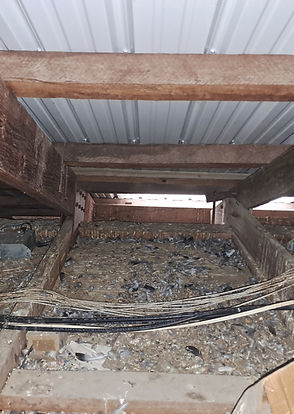
HELP FOR A
BIRD
If you found a baby bird or or an injured or imperilled bird, please contact us via phone or Whatsapp (+501) 610 0400
Help us to help them!

Hatchling - no feathers

Nestling - pin feathers

Almost fledged - most feathers

Fledgling - all feathers
Owl Babies

Nestling: down feathers, not perching. Should be in nest cavity

"Brancher" Some wing feathers & downy body. May be outside the nest with parents feeding

Fledgling - has all feathers
Baby birds do not always need our help
This quick guide may help you decide if he does or not
If in doubt, call/WhatsApp (+501) 610 0400 anytime to talk it through with us
Download our "Quick Guide to helping a baby bird"
Does he only have spiky "pin" feathers, fluffy down, or no feathers at all?
If yes, then he's a hatchling or nestling and belongs in a nest!
-
Call/Whatsapp 610 0400 for advice any time.
-
Check he is not injured
-
Look around for a nearby nest
-
If you can, please put him back in it – the parents will be around and will feed him.
-
Birds do not abandon a baby because you have touched him. They don’t have a good sense of smell – that is a false tale
-
If the nest has been destroyed or is unreachable, you may be able to make a substitute nest with a basket or plastic tub with holes for drainage
-
If the bird "falls" back out of the nest, he is probably sick or injured and he needs help.
Is he a fully-feathered baby?
If yes then he’s a probably a fledgling and he's trying to fly!
Fledglings have all or most of their feathers and leave the nest just before they can fly. The parents are usually nearby and will be feeding the bird. Fledglings can walk, hop and flap, and attempt short flights, but are still being cared for by their parents.
-
Call/Whatsapp 610 0400 for advice any time.
-
Make sure he is not injured (no blood, visible broken bones etc)
-
Leave him alone and watch from a safe distance for the parents to return
-
If he's in danger from predators, put him up as high as you can and watch from a distance. Keep pets and people away.
-
If you can see a nest, you could try replacing him, but likely he will just jump out again
-
You may be able to hear the parents calling and the baby will answer them
-
Do NOT take him far away - the parents may not be able to find him again.
Newly-fledged birds often spend time on the ground before they fly well. This is a natural part of the process, although treacherous.
The birds are watched over and fed by their parents, but if you can gently place the bird on a higher branch, he will be a lot safer.
You can keep him safe, warm and dry in your house overnight, then put him back in the morning to increase his chance of survival.
Owl babies are often found on the ground. If you find a young owl on the ground, try placing it on the highest nearby branch you can find. They will frequently make their way back up the tree.
Call/Whatsapp 610 0400 anytime
Fledglings of all species are are taught vital life skills by their parents. Their best chance of survival is being raised by their parents.
NOTE
-
Most "abandoned" baby birds are healthy fledglings whose parents are nearby and watching over them.
-
Please do NOT ‘kidnap’ healthy birds.
-
REMEMBER: A healthy baby's best chance of survival in the wild is with his parents.
-
PLEASE don't try and care for any wildlife yourself. Wildlife rehab must be done correctly if the bird or animal is to survive in the wild. We have the correct food, nutrition and equipment to raise baby birds, and contact with other organisations who care for all other species of wildlife. We are all trained and experienced wildlife rehab professionals. For the sake of the bird or animal you have rescued, please call us, and give him the best second-chance of freedom possible.
-
If in doubt, call us or send pictures through WhatsApp. 610 0400 anytime!
%20March%202025.jpg)
%20March%202025.jpg)

If you see a bird that needs help:
Please call, text or WhatsApp 610 0400
How do I know if the bird is injured or in trouble?
-
You saw him get hurt
-
He can't stand, or a leg is obviously broken
-
He can't fly, or a wing is drooping/broken
-
You can see blood
-
His eyes are closed or squinty
-
He is permanently fluffed
-
He has been in the same spot for more than one day
If yes to any of these, you need to get him to a veterinarian or to Belize Bird Rescue very quickly. Bird metabolism is fast and he needs help immediately if he is to survive.
Call or WhatsApp on 610 0400 right now for help!
We may ask the following questions:
-
The exact location
-
Type of bird
-
Type of injury
-
How long he has been there
-
Can the bird fly?
-
Will we need nets or ladders?
-
Is the bird in water? Can he swim?
-
Is he in an open area or close to bush or mangrove he will run into if approached?
-
Can you send a photograph of the situation?
-
Can you wait and watch while we get help to you?
-
If you already have him contained, would you be able to reach a veterinarian with the bird?
If you plan to contain and/or transport the bird
(We do not advise inexperienced members of the public to attempt capture)
-
Injured birds are scared and in pain: they will do anything to avoid capture
-
Many birds have sharp beaks, claws and even strong legs, necks and wings. Do NOT endanger yourself during capture or restraint. Protect your eyes and face, particularly around raptors and water-birds
-
If you have already restrained the bird, make absolutely sure he cannot get out of the container during transport
-
Make sure he has airholes to breathe during transport. Ideally, a soft liner in the container to avoid sliding and causing further damage to his injuries
-
Do NOT tape a beak shut
-
Do NOT offer food or water without talking to us first


Birds are smart, resourceful opportunists, and in the same way that we have moved into their territory, they can move into ours!
Birds in your roof space
These are usually pigeons or owls, and we appreciate that they often create noise, mess and smell.
Belize Bird Rescue will help with the safe removal of these unwanted guests under certain conditions. Contact us to discuss your circumstances and possible solutions that work for everyone, including the birds.
Birds attacking people
This is another common issue and it's usually grackles or "blackbirds" as they are locally known.
Grackles attack when they have nests nearby and their chicks are close to fledging. We ask you to be patient while the chicks fly from the nest and eventually they will leave the nest site and the problem will stop. We have had people report success and even 'fun' using an umbrella for protection as they go through the danger zone!
Noisy birds at night
Unfortunately this is the poor grackles again! These reports usually come from residential areas, resorts and hotels where humans have planted trees to provide attractive landscaping and shade, and installed lights for safety and security. The rich foliage trees are perfect for nesting and the lights keep the birds singing all night. Sadly the only way to stop the noise is to remove the trees or turn off the lights, and neither option is a popular choice for these establishments.
Too much poop!
These reports are about multiple species such as pigeons and grackles (again), nesting songbirds, gulls and terns, pelicans, owls and also bats. There are multiple potential solutions which are not simple and not guarranteed to work, but please get in touch with us and we will see if we can help with your particular circumstance.
It is illegal to capture or keep a wild parrot in Belize. If your family have had the same parrot for a number of years, you must get a permit from the Belize Forest Department in order to keep him legally.
You cannot get a permit for a newly caught or young bird.
Cut-off date to submit permit applications 31st March 2026
Permit requirements and application information here
If you would like to report a captive parrot, or surrender your captive parrot for rehabilitation and eventual release, contact us in complete confidence

Wildlife Organisations in Belize
Belize international prefix +501
All cell numbers (beginning with a 6) use WhatsApp
-
Belize Forest Department Office 822 1524 (For all wildlife & forest related issues, office hours only)
-
Belize Forest Department HOTLINE 610 1524 (call, text, WhatsApp)
-
Belize Bird Rescue 610 0400 (All wildlife, especially birds)
-
ACES Wildlife Rescue 623 7920 (All wildlife Ambergris & Caye Caulker)
-
Wildtracks 660 4820 (All wildlife especially monkeys and manatees)
-
The Belize Zoo 613 4966 (All wildlife especially tapirs & jaguars)
-
CRC 660 3936 (All wildlife especially crocs and other reptiles)
-
BWRC 615 5159 (Medical care for injured wildlife)

